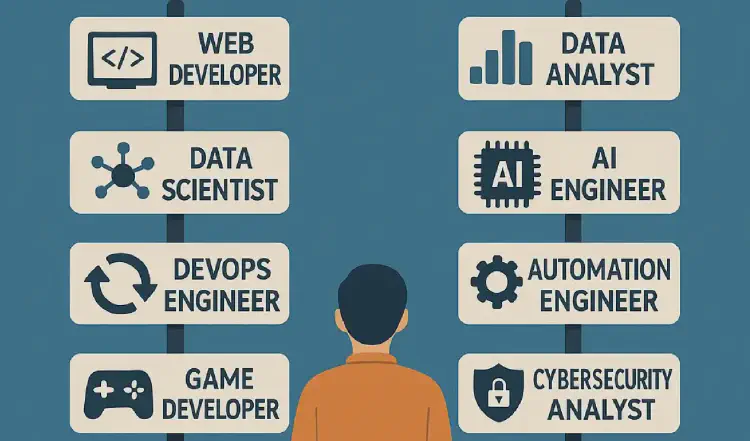Python Career Paths: Where Can It Take You?
Discover the Most In-Demand Roles You Can Pursue With Python Skills
- | 5 min read

Have you already decided to learn Python but still don’t know what career path to take? You’re not alone. Python is such a versatile language that it opens the door to a wide range of exciting and well-paid career opportunities. Whether you’re into building websites, analyzing data, or developing cutting-edge AI, Python can be your gateway.
In this guide, we’ll walk you through the most popular and in-demand career paths for Python developers, the skills required for each, and why Python continues to dominate the tech world.
1. Web Developer
If you enjoy creating user-friendly websites and web apps, web development might be the path for you. Python frameworks like Django and Flask make backend development clean and efficient.
Key Skills:
- HTML, CSS, JavaScript
- Django or Flask
- REST APIs
- SQL and databases
Typical Roles:
- Backend Developer
- Full-Stack Developer
2. Data Analyst
Do you like digging into data and finding insights that help companies make smarter decisions? Data analysts use Python to clean, analyze, and visualize data using powerful libraries like Pandas and Matplotlib.
Key Skills:
- Pandas
- NumPy
- Matplotlib
- Seaborn
- SQL
- Excel
Typical Roles:
- Junior/Senior Data Analyst
- Business Intelligence Analyst
3. Data Scientist
If you’re ready to go beyond analysis and start building models that predict the future, data science is the way to go. Python’s ecosystem is ideal for data scientists.
Key Skills:
- Machine Learning (scikit-learn, TensorFlow)
- Data cleaning and preprocessing
- Statistics and probability
- Data storytelling
Typical Roles:
- Data Scientist
- Machine Learning Engineer
4. AI Engineer / Machine Learning Engineer
This path focuses on building systems that can learn and make decisions. From recommendation engines to autonomous vehicles, Python is at the core.
Key Skills:
- Deep learning (PyTorch, TensorFlow, Keras)
- Natural Language Processing (spaCy, NLTK)
- Computer vision (OpenCV)
- Model deployment
Typical Roles:
- AI Engineer
- Machine Learning Engineer
5. DevOps Engineer
If you enjoy automation, infrastructure, and deployment, DevOps might be the right track. Python is commonly used for scripting and automation in DevOps pipelines.
Key Skills:
- CI/CD tools (Jenkins, GitHub Actions)
- Docker and Kubernetes
- Cloud platforms (AWS, Azure, GCP)
- Bash/Shell scripting
Typical Roles:
- DevOps Engineer
- Site Reliability Engineer (SRE)
6. Automation Engineer / Scripting
Sometimes, writing code isn’t about building apps—it’s about making tedious tasks disappear. Python is great for automating file management, emails, scraping data, and more.
Key Skills:
- Scripting basics
- Working with APIs
- Scheduling tools (cron, Airflow)
Typical Roles:
- Automation Engineer
- Python Scripting Specialist
7. Game Developer
Python might not be the first language you think of for game development, but with libraries like Pygame, it’s a great starting point for indie games or educational tools.
Key Skills:
- Pygame
- Game loops and logic
- Graphics and animation basics
Typical Roles:
- Game Developer (Entry Level)
- Indie Game Creator
8. Cybersecurity Analyst
Cybersecurity professionals use Python for scripting tools, analyzing malware, and automating security tasks. It’s a useful tool in a fast-growing industry.
Key Skills:
- Networking basics
- Ethical hacking tools
- Scripting automation
- Data analysis
Typical Roles:
- Security Analyst
- Penetration Tester
9. Financial Analyst / FinTech Developer
Python is becoming a standard tool in finance for quantitative analysis, trading algorithms, and financial modelling.
Key Skills:
- Pandas
- NumPy
- Data visualization
- API integration
- Financial modeling
Typical Roles:
- Financial Analyst
- Quantitative Developer
How to Choose Your Path
Not sure which Python career path is right for you? Don’t worry—choosing a direction doesn’t have to feel overwhelming. Think of it as discovering what excites you the most, then using Python as your tool to get there. Here’s how to break it down:

1. Identify What Interests You
Start by asking yourself a few simple questions:
- Do you enjoy building websites or user interfaces? → You might enjoy Web Development.
- Do numbers, patterns, and logic excite you? → Look into Data Analysis or Machine Learning.
- Are you curious about how to make computers “think”? → AI Engineering could be a perfect fit.
- Want to create games, apps, or fun tools? → Game Development or Software Engineering might be for you.
- Do you like solving real-world problems efficiently? → Explore Automation and Scripting.
- Do you care about digital safety? → Consider Cybersecurity or Penetration Testing.
2. Explore Real-World Applications
Sometimes it helps to see how Python is actually used in the roles you’re curious about. Spend some time watching YouTube tutorials, reading blogs, or trying mini projects in different domains.
3. Match Your Personality & Goals
Some roles require more interaction, while others are more analytical or creative:
- Creative & visual thinker? → Try Front-end Web Development or Game Design.
- Problem-solver who likes puzzles? → Back-end Development or Cybersecurity might suit you.
- Love organizing and understanding data? → Go for Data Analysis or Business Intelligence.
- Want to be part of cutting-edge innovation? → AI/ML or IoT is calling your name.
4. Look at Job Market Trends
Check job boards like LinkedIn or Indeed to see what roles are in high demand. You’ll often find:
- Data Analysts and AI Engineers are growing rapidly.
- Web Developers are needed across nearly every business.
- Automation Experts and DevOps Engineers are hot in companies looking to scale.
Your Tech Journey Begins Here—With Linero Tech and Python
No matter which path you choose, it all starts with learning the fundamentals. At Linero Tech, our Python course for beginners is designed to help you build a strong foundation, practice real coding, and discover your ideal career path. Whether you’re starting fresh or re-skilling, we’re here to guide you step by step.
Ready to start learning Python—with support every step of the way?
👉 Discover our tech training programs
👉 See student reviews and success stories
